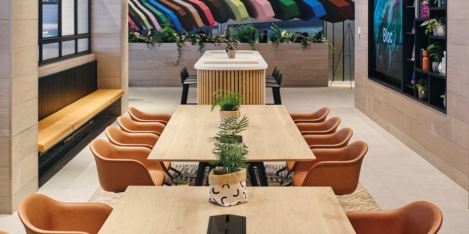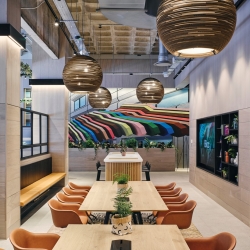To provide the best experiences, we use technologies like cookies to store and/or access device information. Consenting to these technologies will allow us to process data such as browsing behaviour or unique IDs on this site. Not consenting or withdrawing consent, may adversely affect certain features and functions.
The technical storage or access is strictly necessary for the legitimate purpose of enabling the use of a specific service explicitly requested by the subscriber or user, or for the sole purpose of carrying out the transmission of a communication over an electronic communications network.
The technical storage or access is necessary for the legitimate purpose of storing preferences that are not requested by the subscriber or user.
The technical storage or access that is used exclusively for statistical purposes.
The technical storage or access that is used exclusively for anonymous statistical purposes. Without a subpoena, voluntary compliance on the part of your Internet Service Provider, or additional records from a third party, information stored or retrieved for this purpose alone cannot usually be used to identify you.
The technical storage or access is required to create user profiles to send advertising, or to track the user on a website or across several websites for similar marketing purposes.
 Mindspace, the global flex office provider, secured a funding of $72 million. The investment round is intended to support the continuation of the company’s growth and its further expansion in Europe, the United States and Israel. The round was led by Harel Insurance Investments and Financial Services Ltd., More Provident Funds, Shalom Meckenzie, Arkin Holdings and existing investors. Existing investors include: Yoav Harlap, Kobi Rogovin and Globalworth (GWI:LSE). (more…)
Mindspace, the global flex office provider, secured a funding of $72 million. The investment round is intended to support the continuation of the company’s growth and its further expansion in Europe, the United States and Israel. The round was led by Harel Insurance Investments and Financial Services Ltd., More Provident Funds, Shalom Meckenzie, Arkin Holdings and existing investors. Existing investors include: Yoav Harlap, Kobi Rogovin and Globalworth (GWI:LSE). (more…)






 A new report ‘
A new report ‘
 A survey of hybrid-office and home-based UK workers gives insight for employers into some of today’s biggest needs for office workers to carry out their roles. 73 percent of UK workers believe that the provision of ergonomic work conditions, as well as support for their health, will play a bigger role when choosing a company to work for.
A survey of hybrid-office and home-based UK workers gives insight for employers into some of today’s biggest needs for office workers to carry out their roles. 73 percent of UK workers believe that the provision of ergonomic work conditions, as well as support for their health, will play a bigger role when choosing a company to work for. 




 More than half of young professionals (those aged 16-34), feel burnt out right now, according to new research exploring experiences of burnout pre and post pandemic from people analytics company,
More than half of young professionals (those aged 16-34), feel burnt out right now, according to new research exploring experiences of burnout pre and post pandemic from people analytics company, 
 A new research report released by
A new research report released by 
 Almost half (47 percent) of employers report having vacancies that are hard-to-fill, and more than one in four (27 percent) expect the number of vacancies that are difficult to fill to increase in the next six months. This is a key finding of the latest quarterly
Almost half (47 percent) of employers report having vacancies that are hard-to-fill, and more than one in four (27 percent) expect the number of vacancies that are difficult to fill to increase in the next six months. This is a key finding of the latest quarterly 
 Hybrid working could save the NHS more than £4 billion per year by giving workers more time to look after themselves and their families, according to a new study by
Hybrid working could save the NHS more than £4 billion per year by giving workers more time to look after themselves and their families, according to a new study by 
 Huge swathes of workers have been returning to the office in recent weeks – many for the first time in almost two years. A significant number of companies, however, will never return to the pre-pandemic ‘normal’ of a five-day office week and will instead integrate hybrid working permanently. According to the
Huge swathes of workers have been returning to the office in recent weeks – many for the first time in almost two years. A significant number of companies, however, will never return to the pre-pandemic ‘normal’ of a five-day office week and will instead integrate hybrid working permanently. According to the 
 Holbein Gardens, located at 7 Holbein Place in the heart of London’s Belgravia, will lead the way for future schemes on the road to achieving net zero carbon. Independent multidisciplinary engineering consultancy
Holbein Gardens, located at 7 Holbein Place in the heart of London’s Belgravia, will lead the way for future schemes on the road to achieving net zero carbon. Independent multidisciplinary engineering consultancy 







November 19, 2021
Workplace data proves that the devil is in the detail for the new era of work
by Steve Morren • Comment, Flexible working, Technology, Workplace design